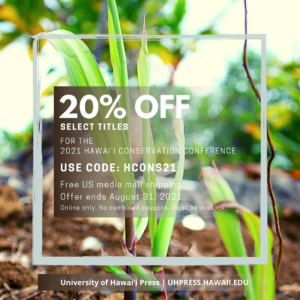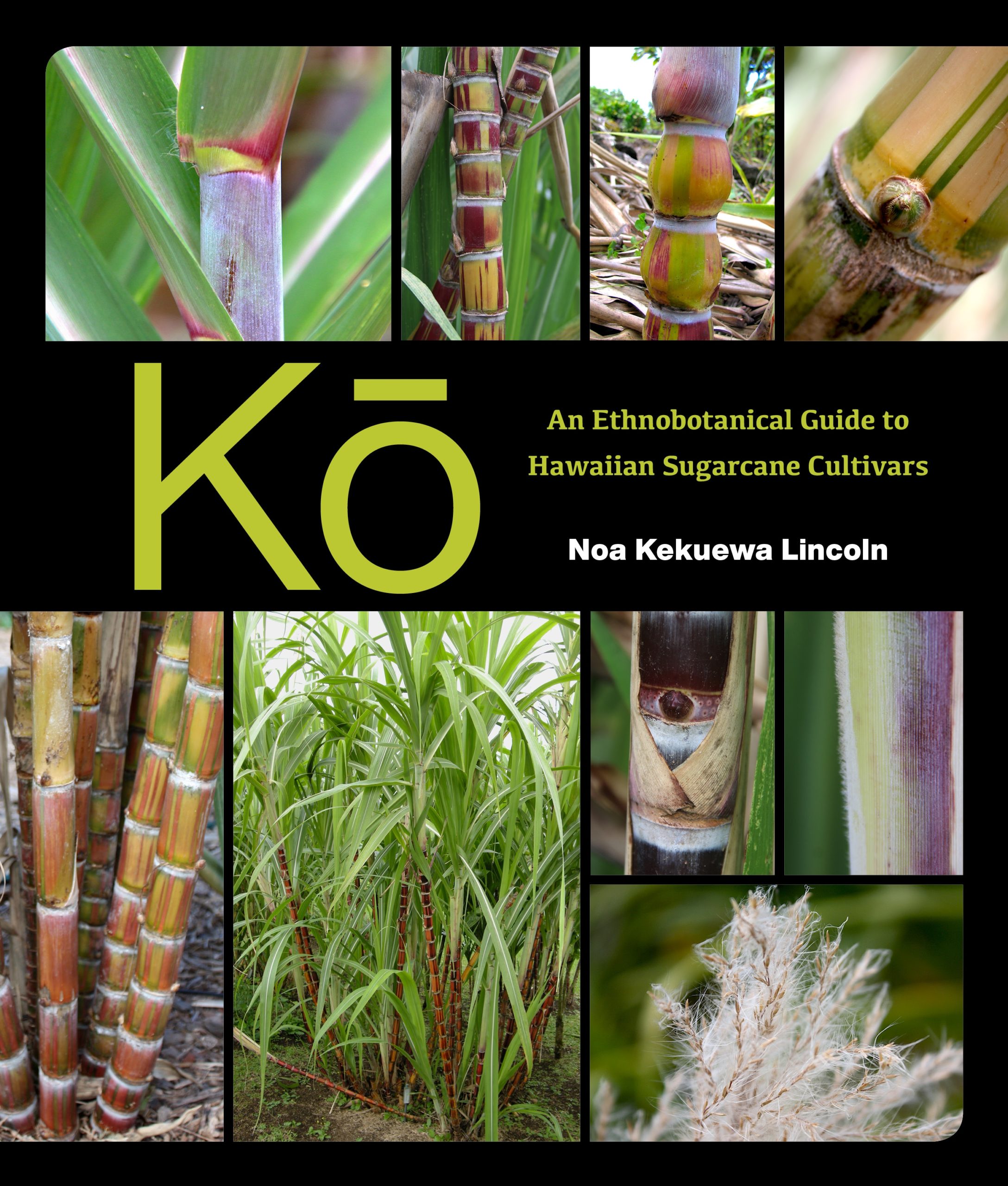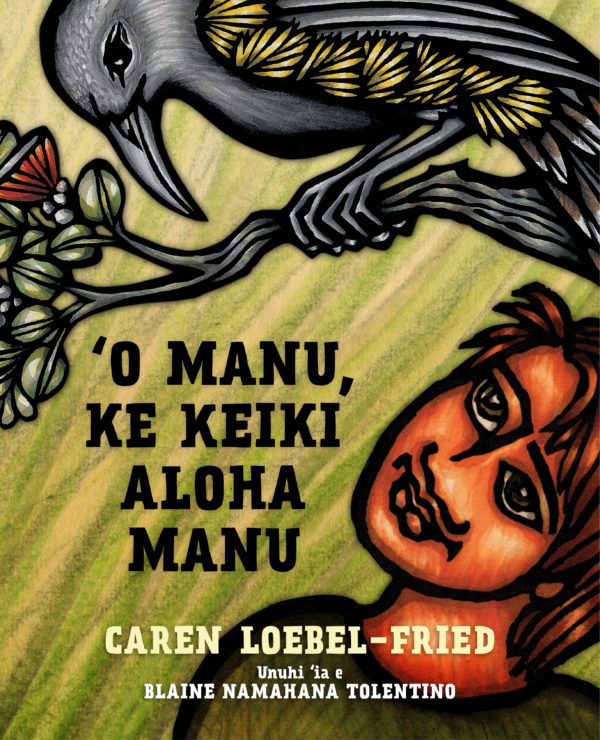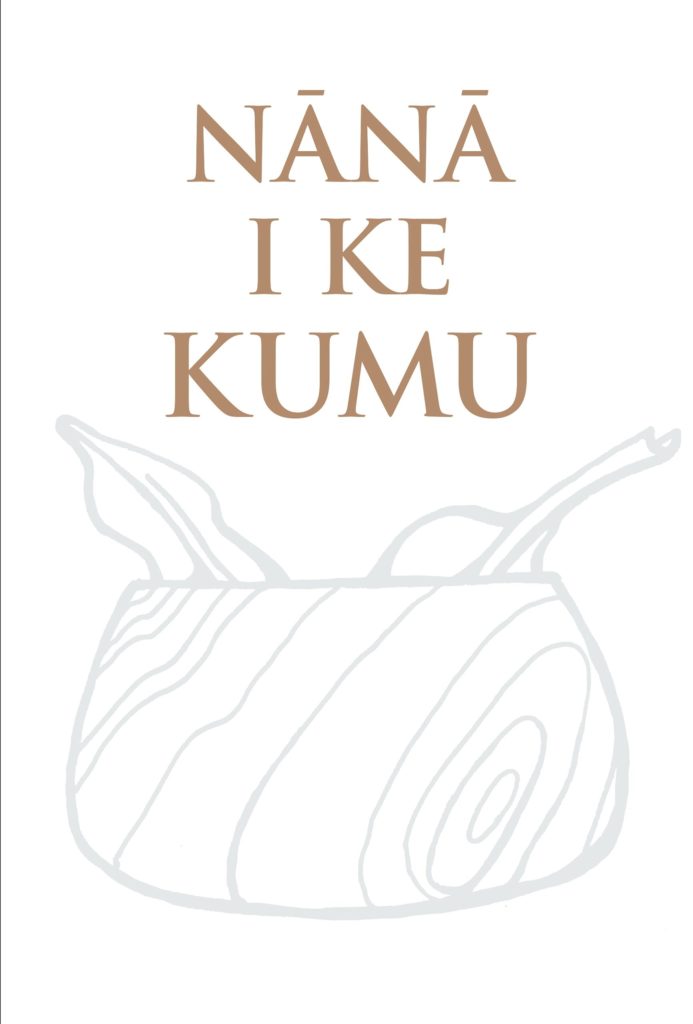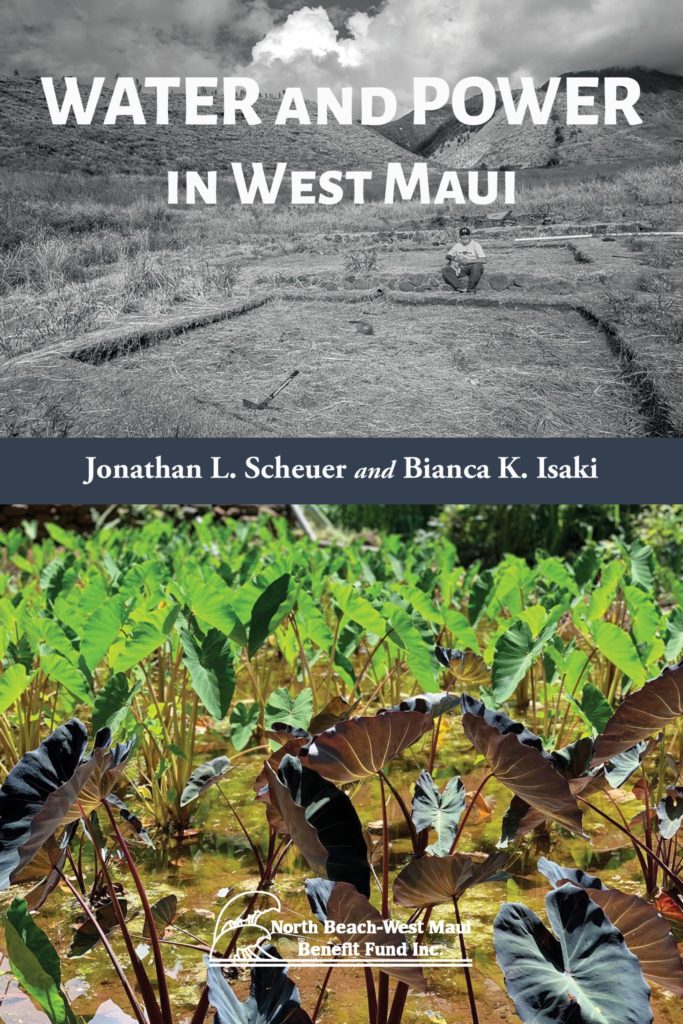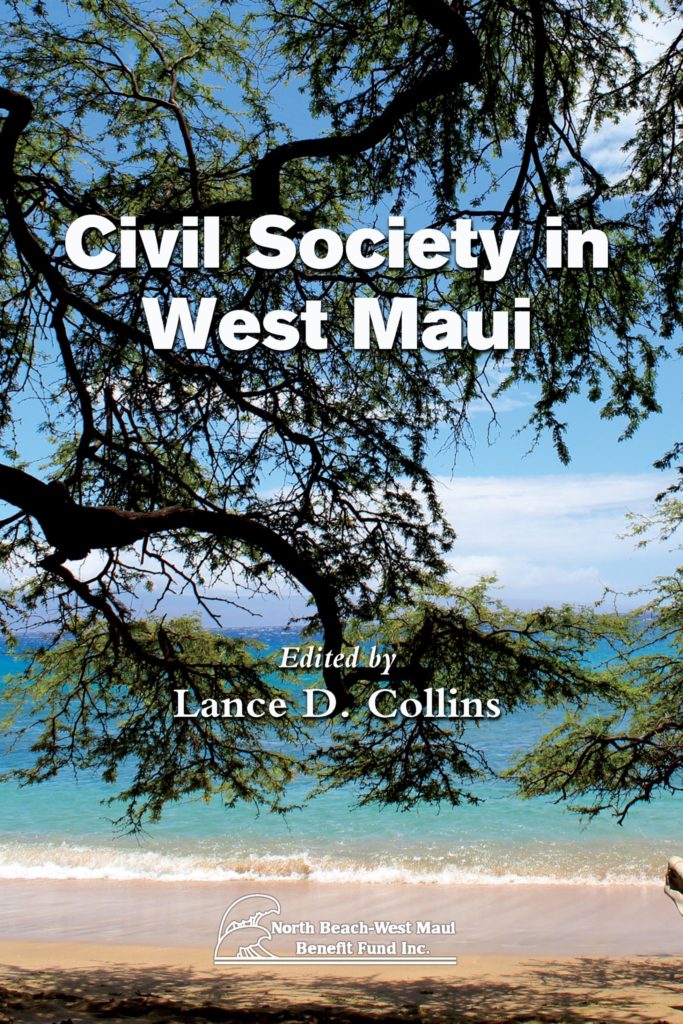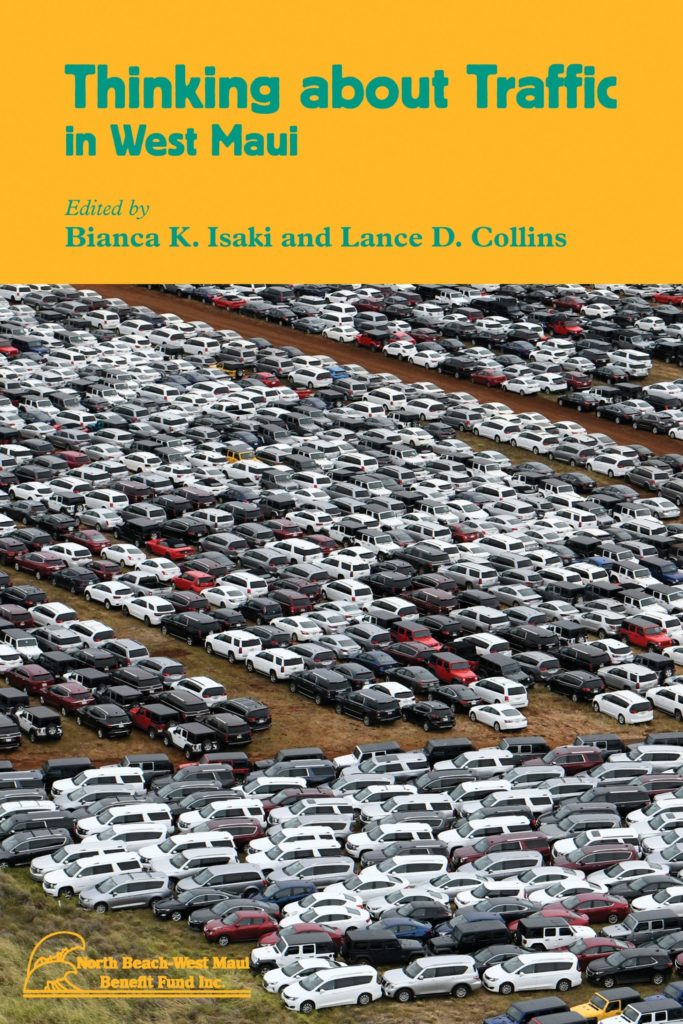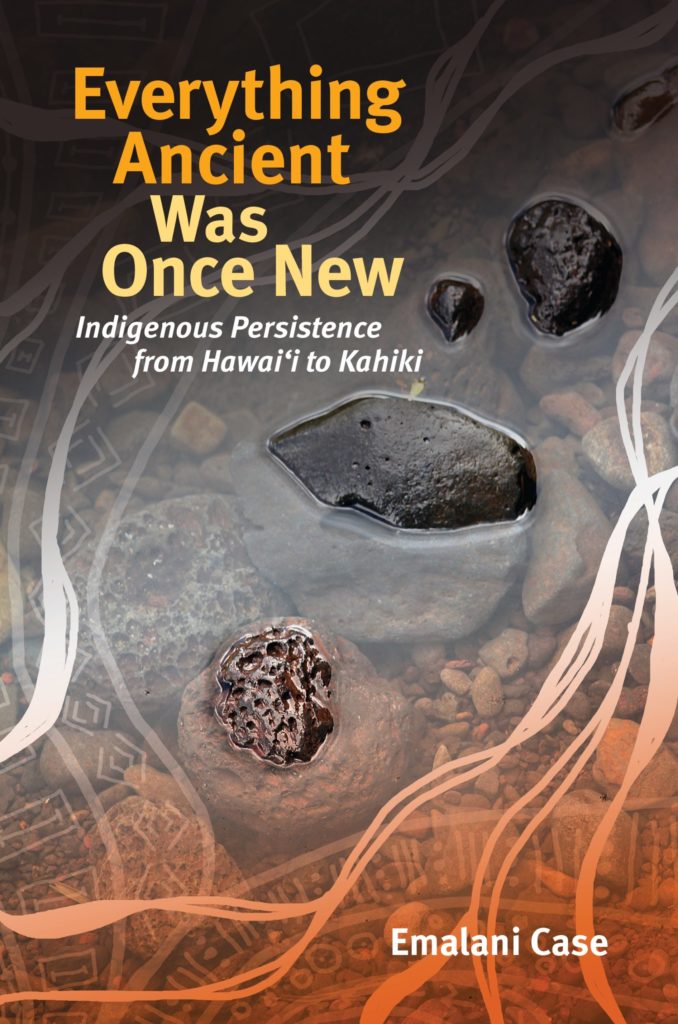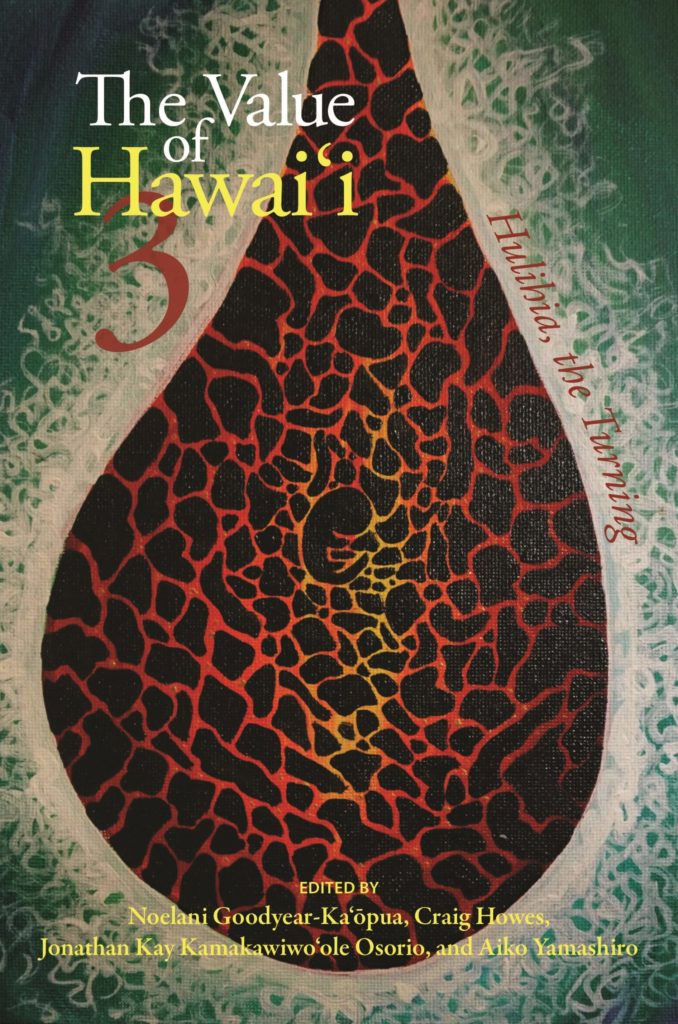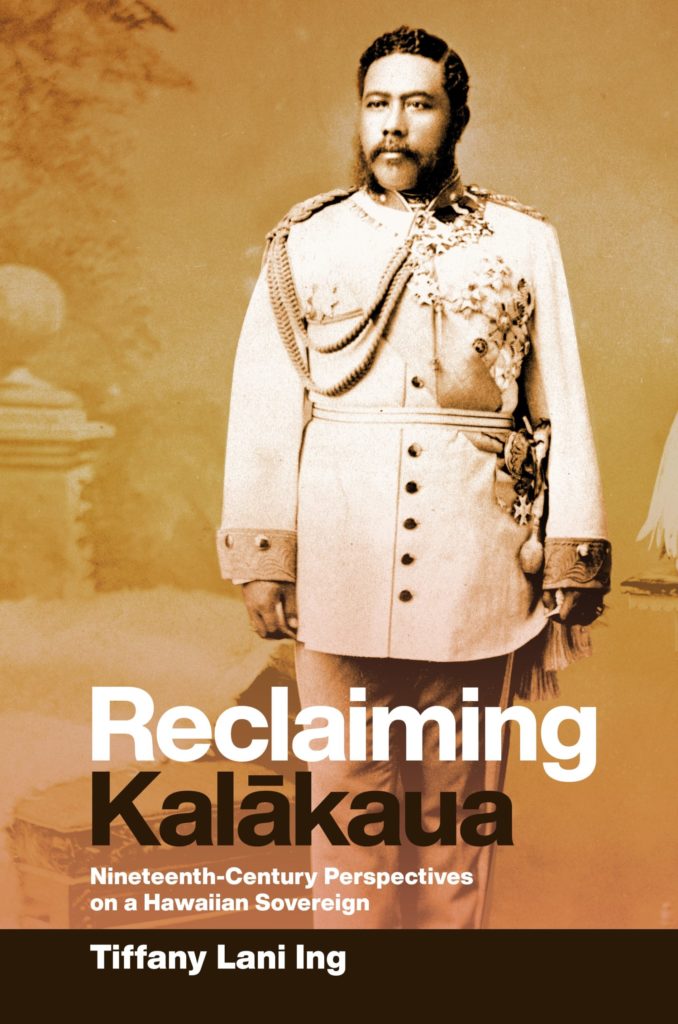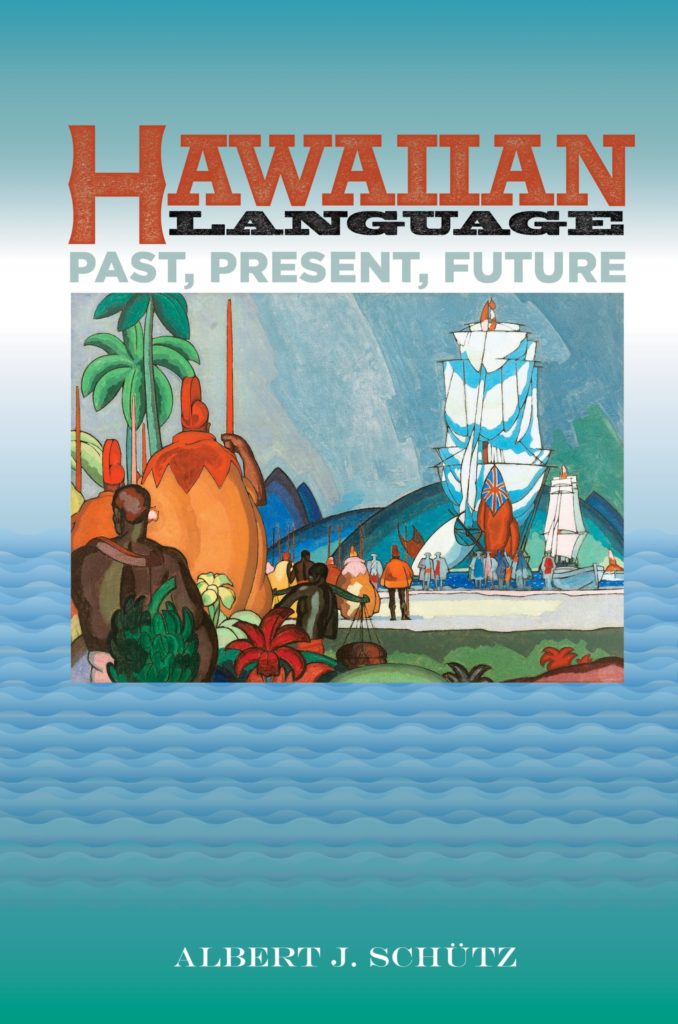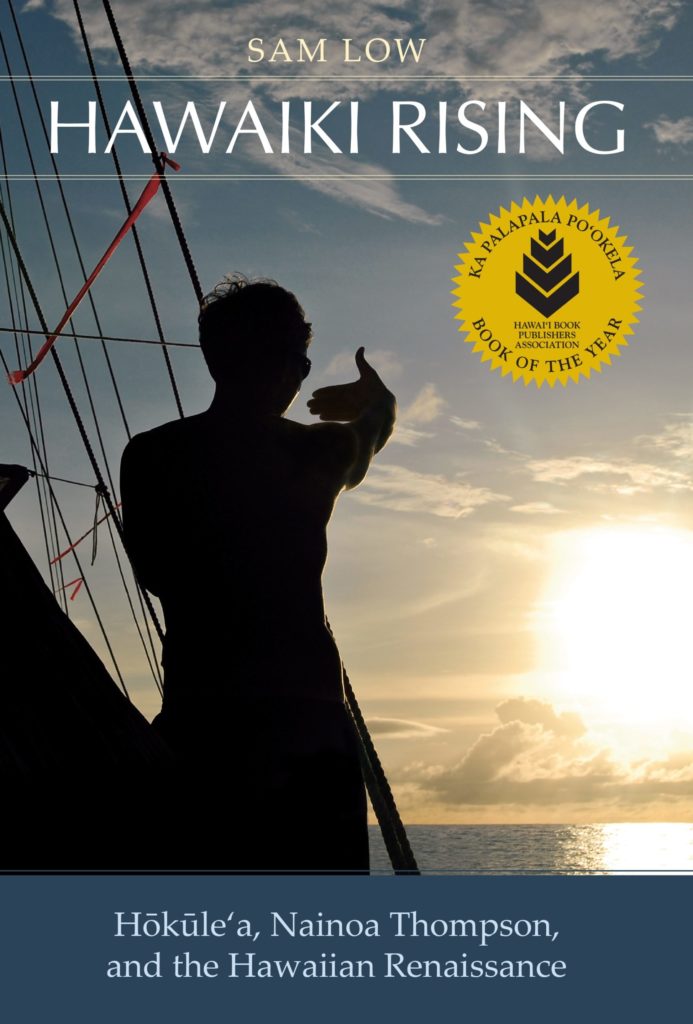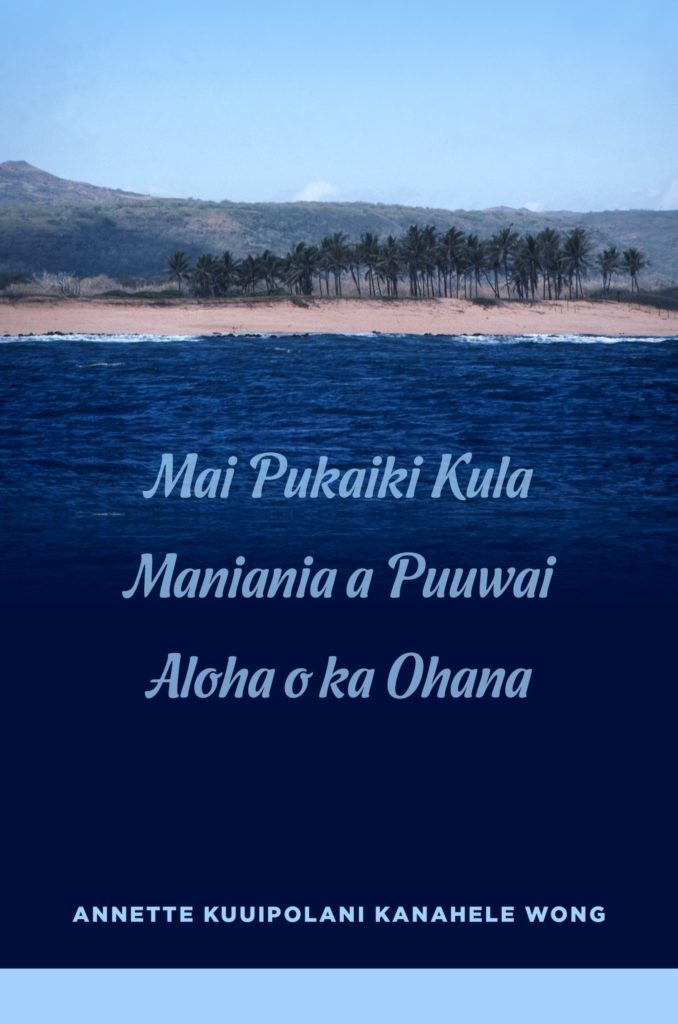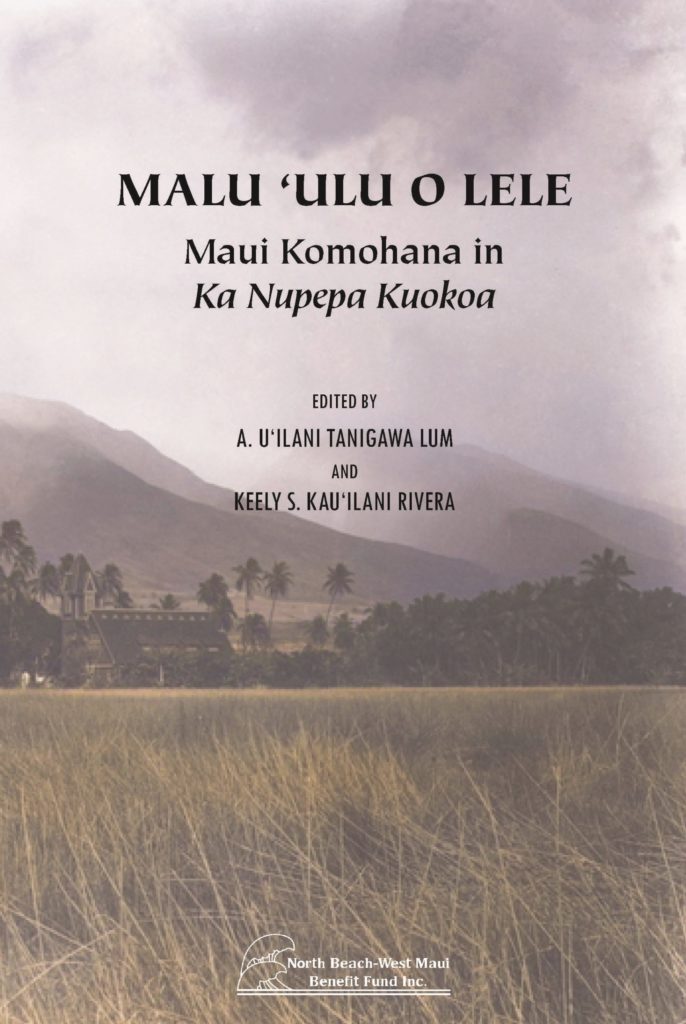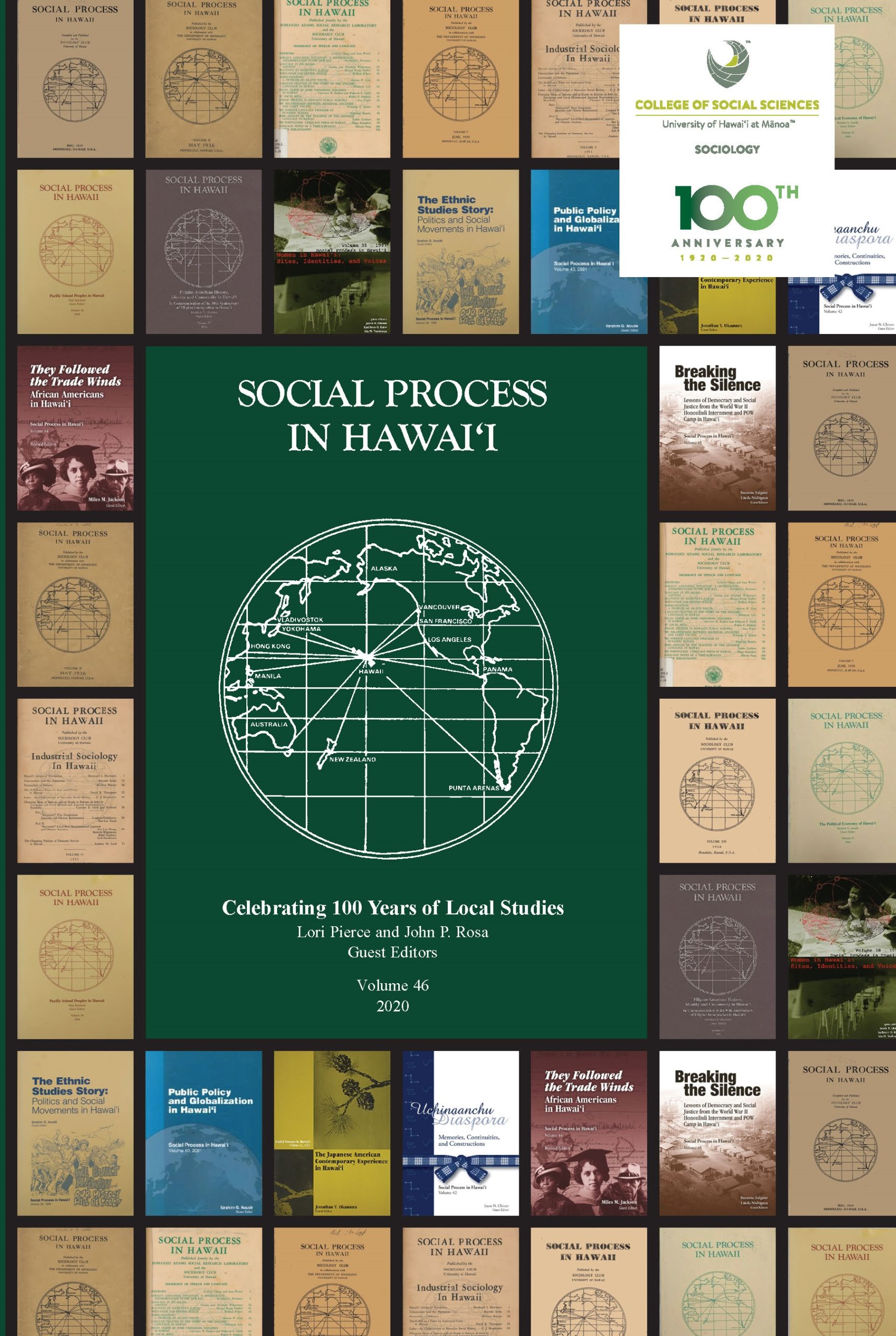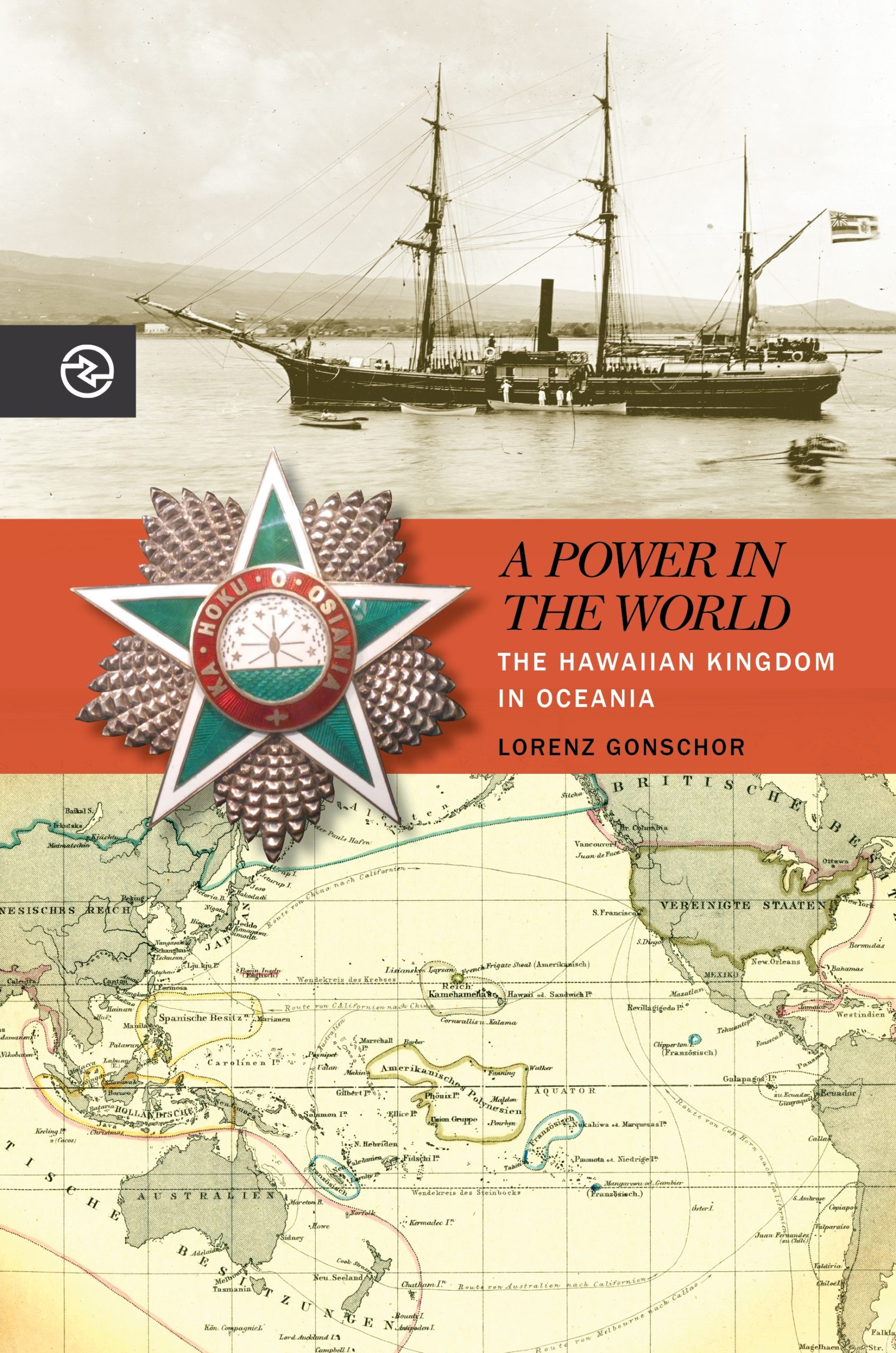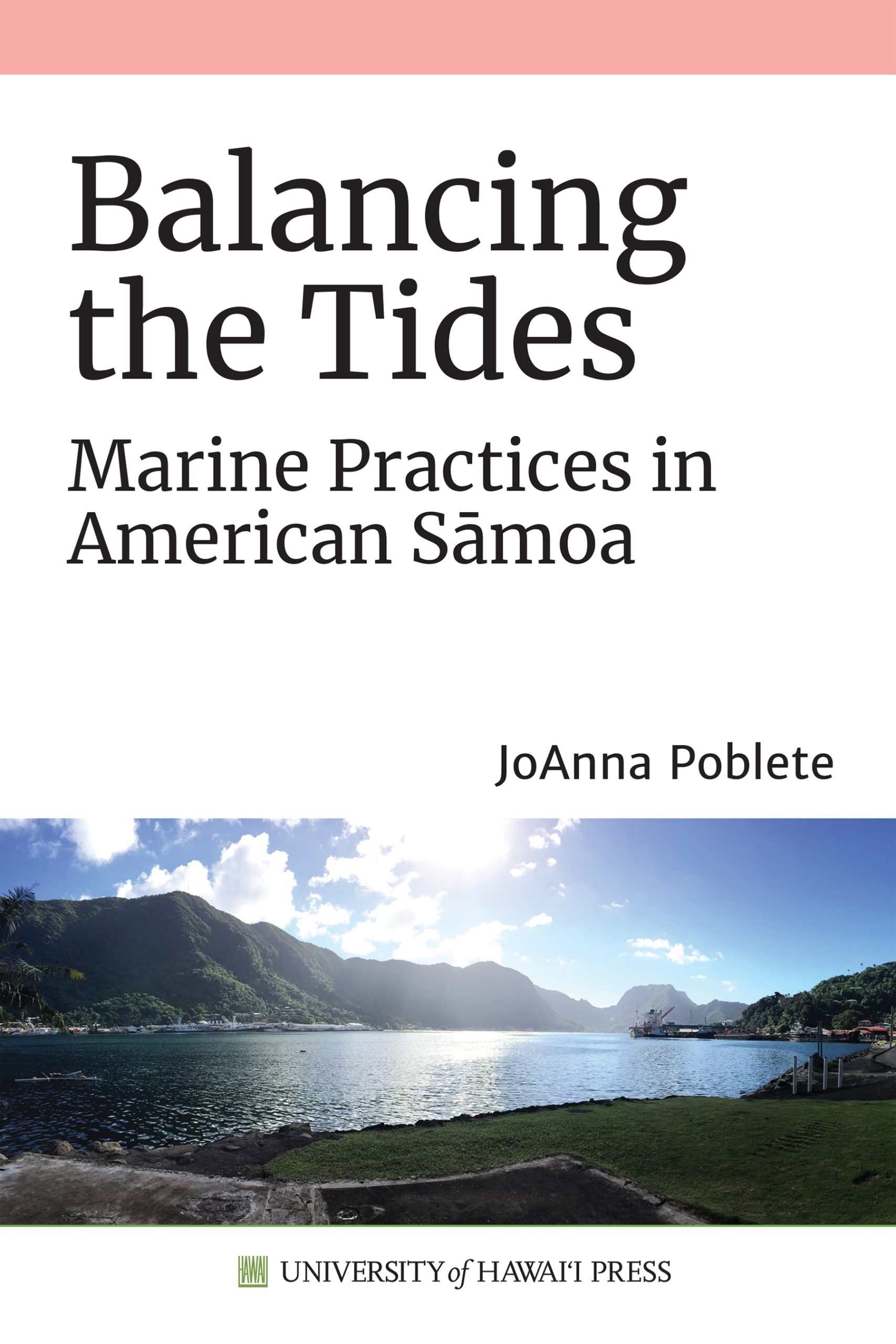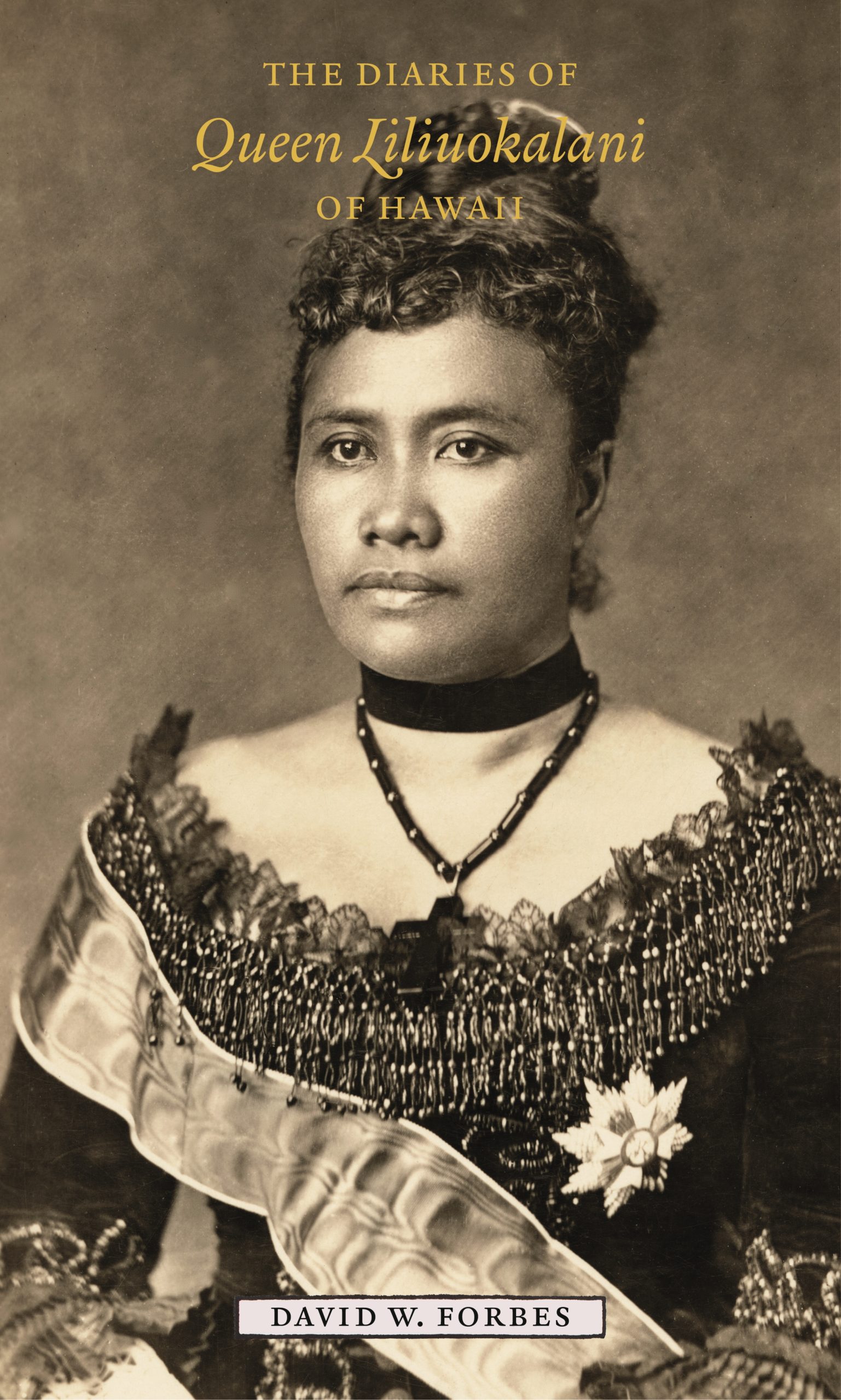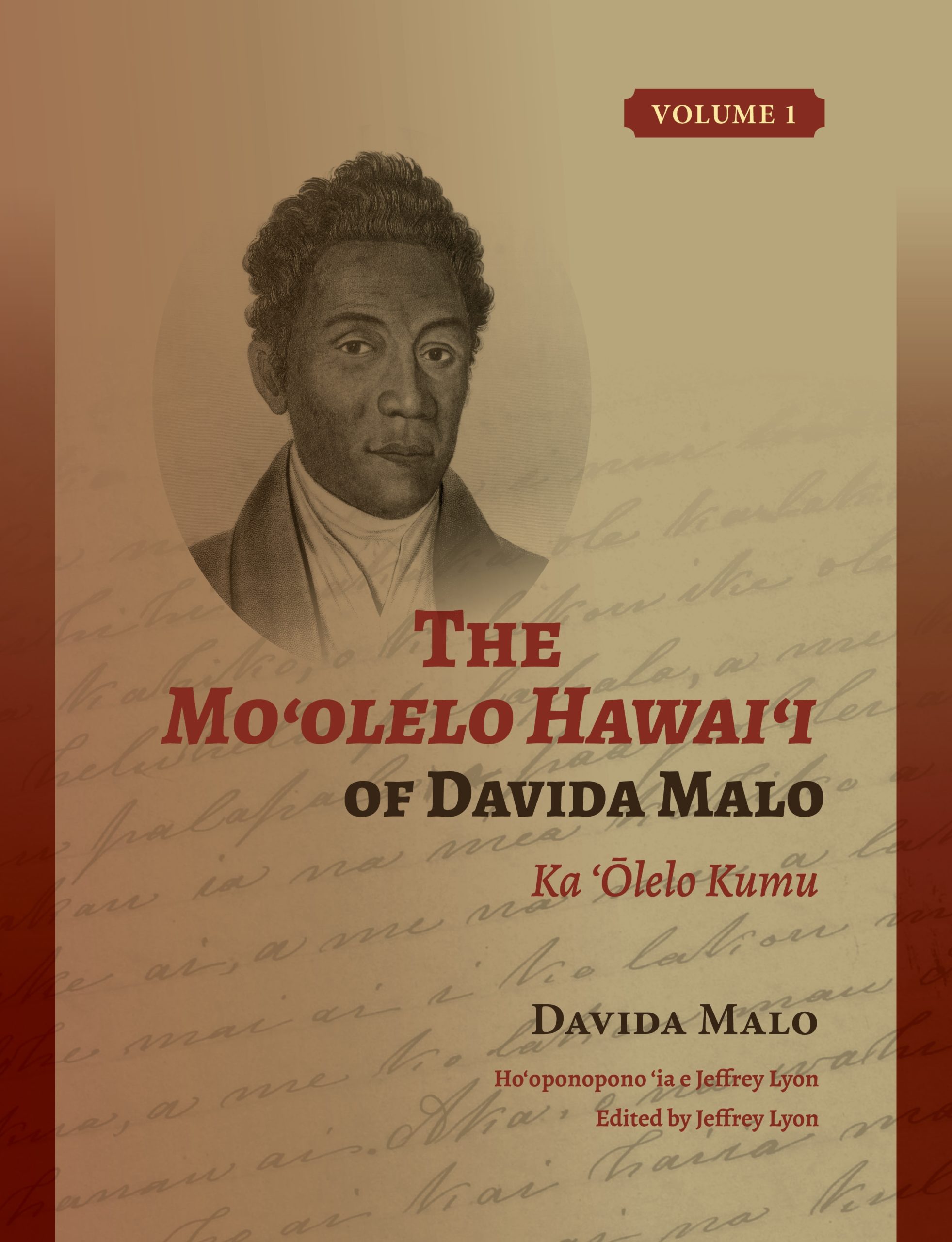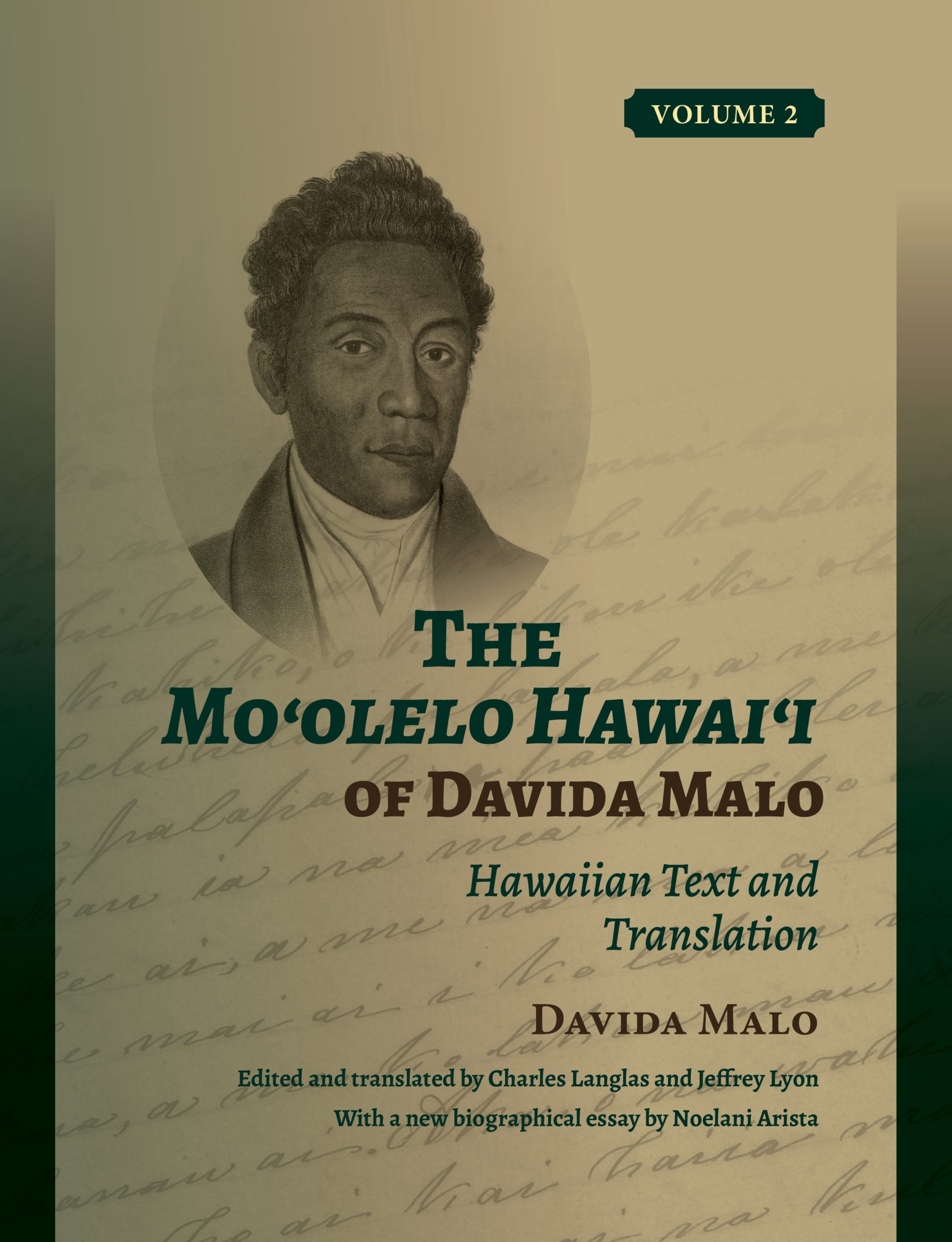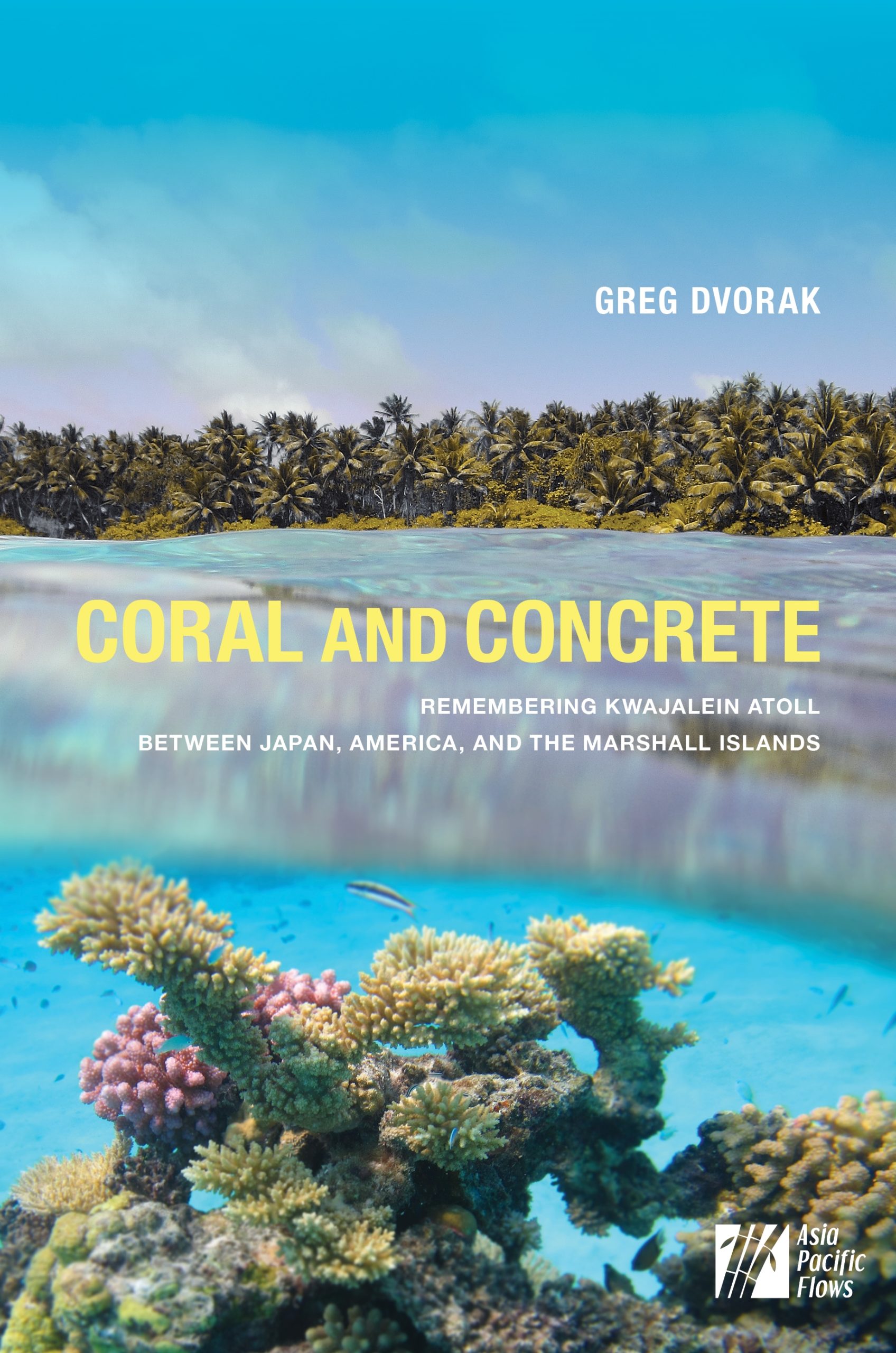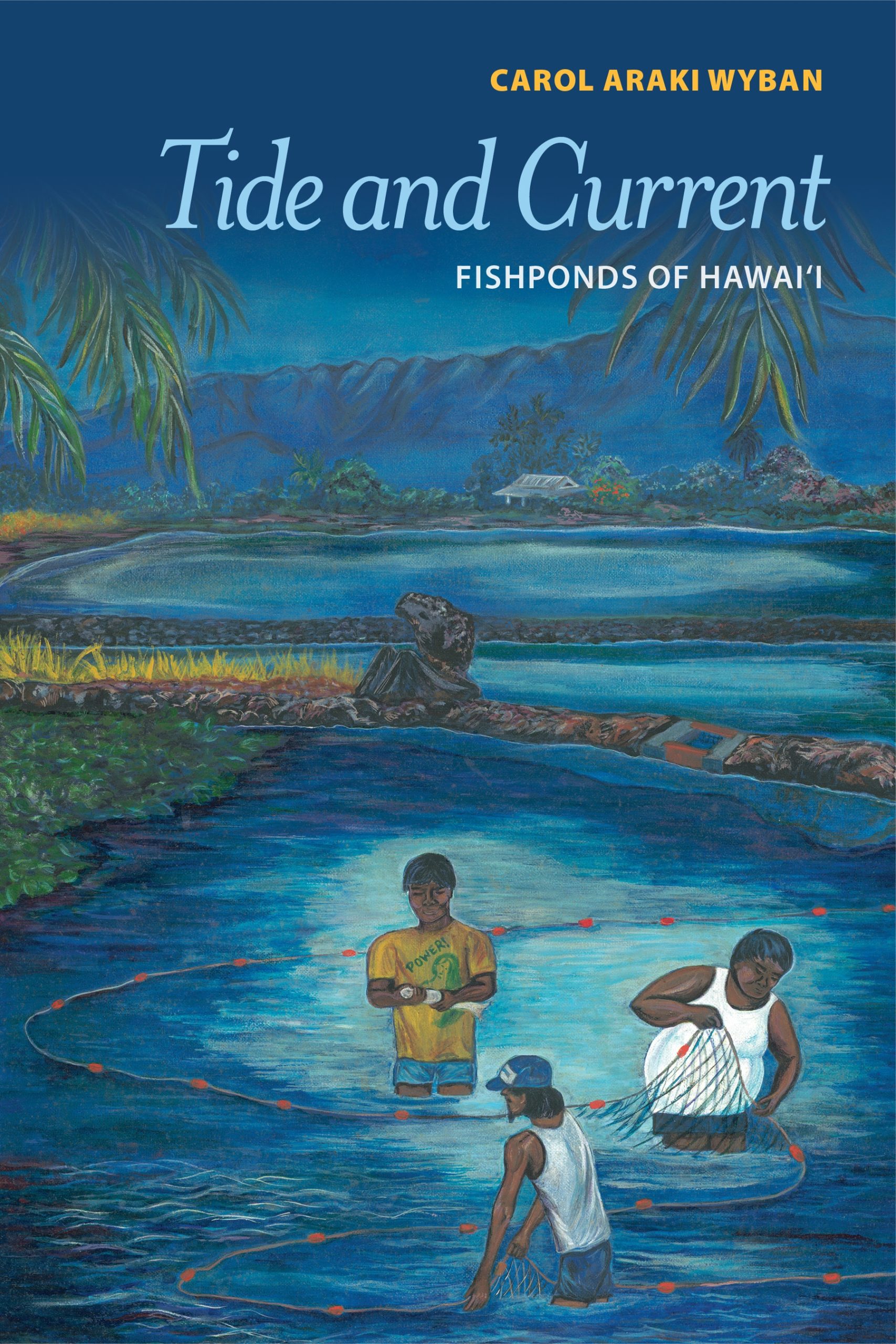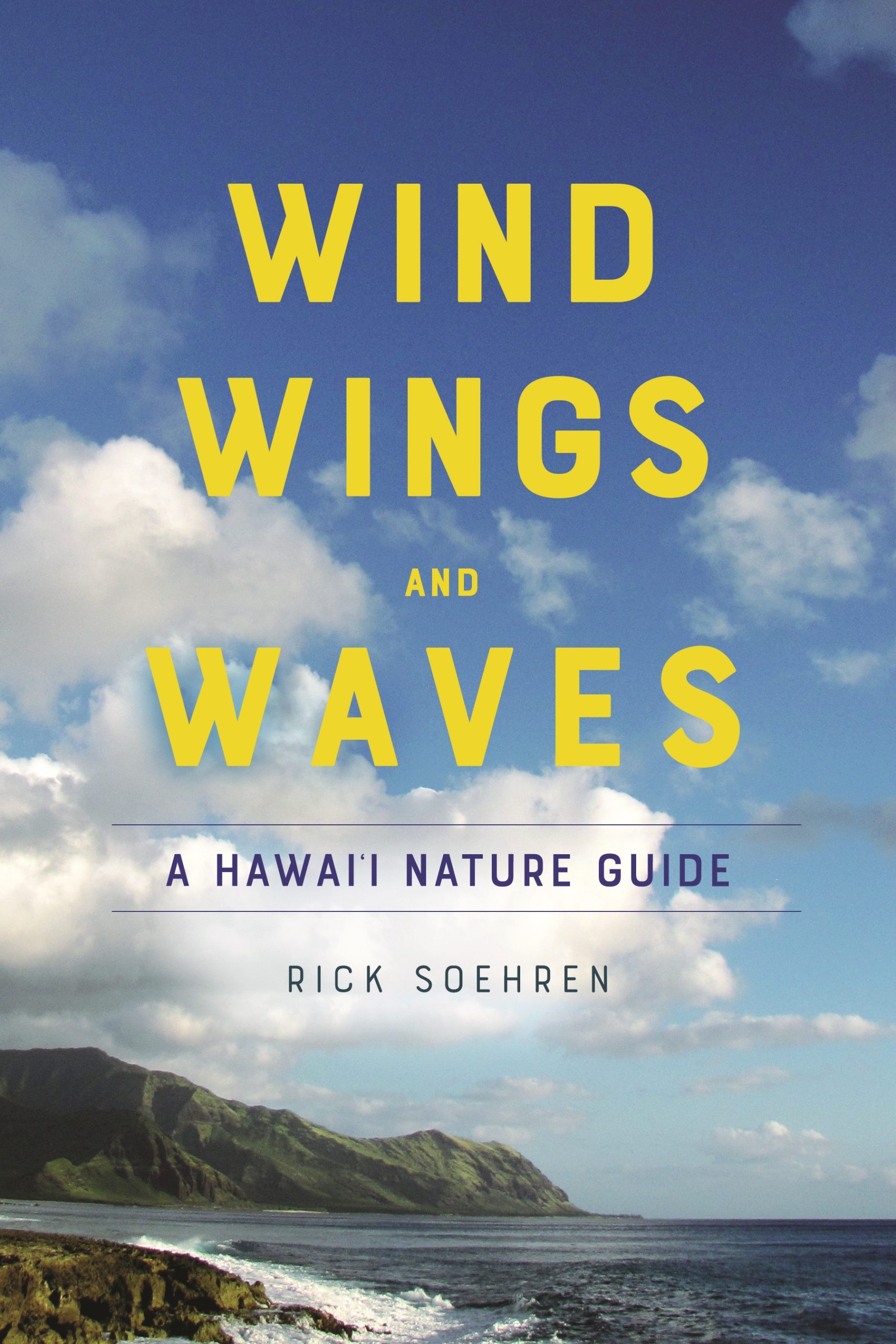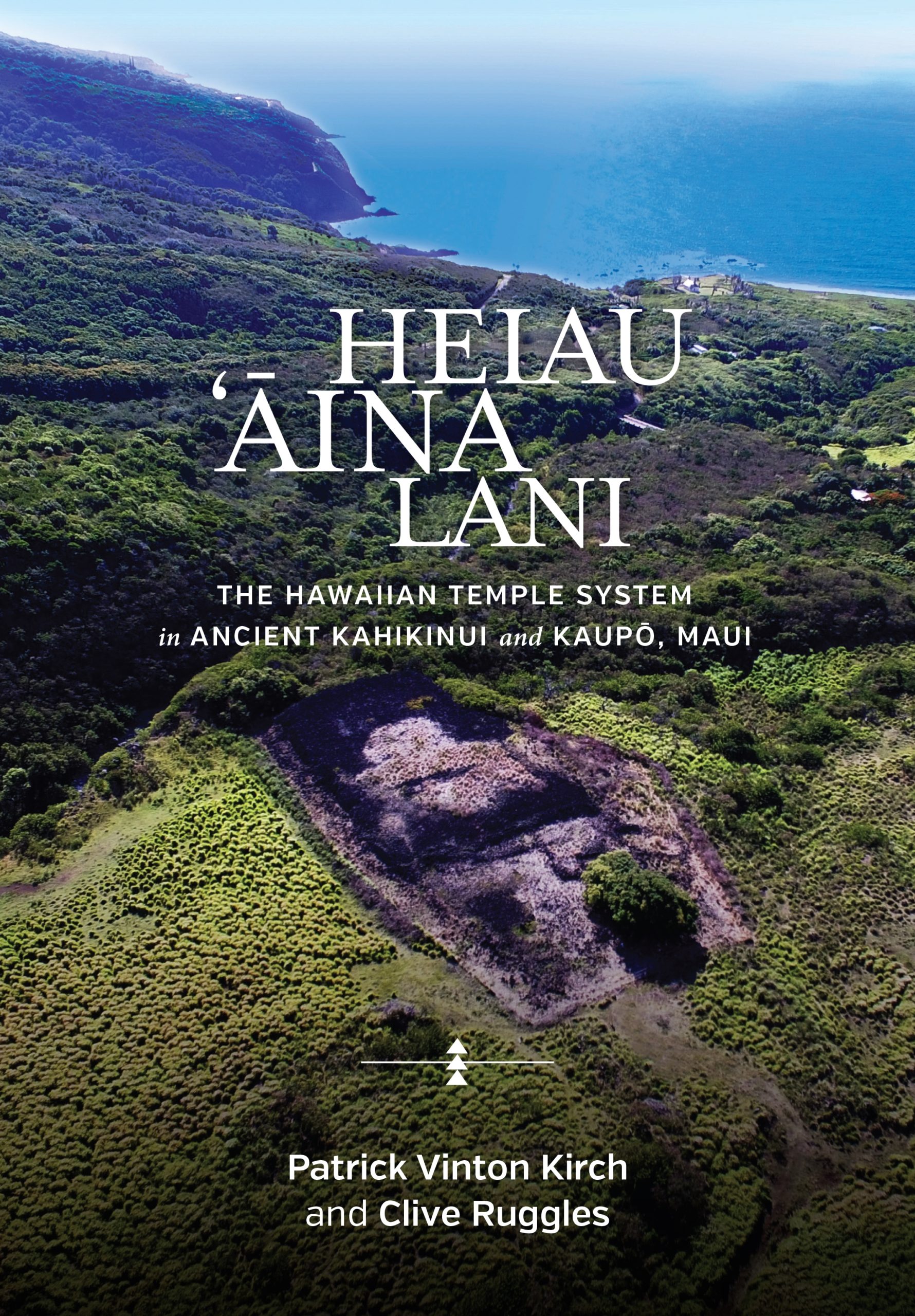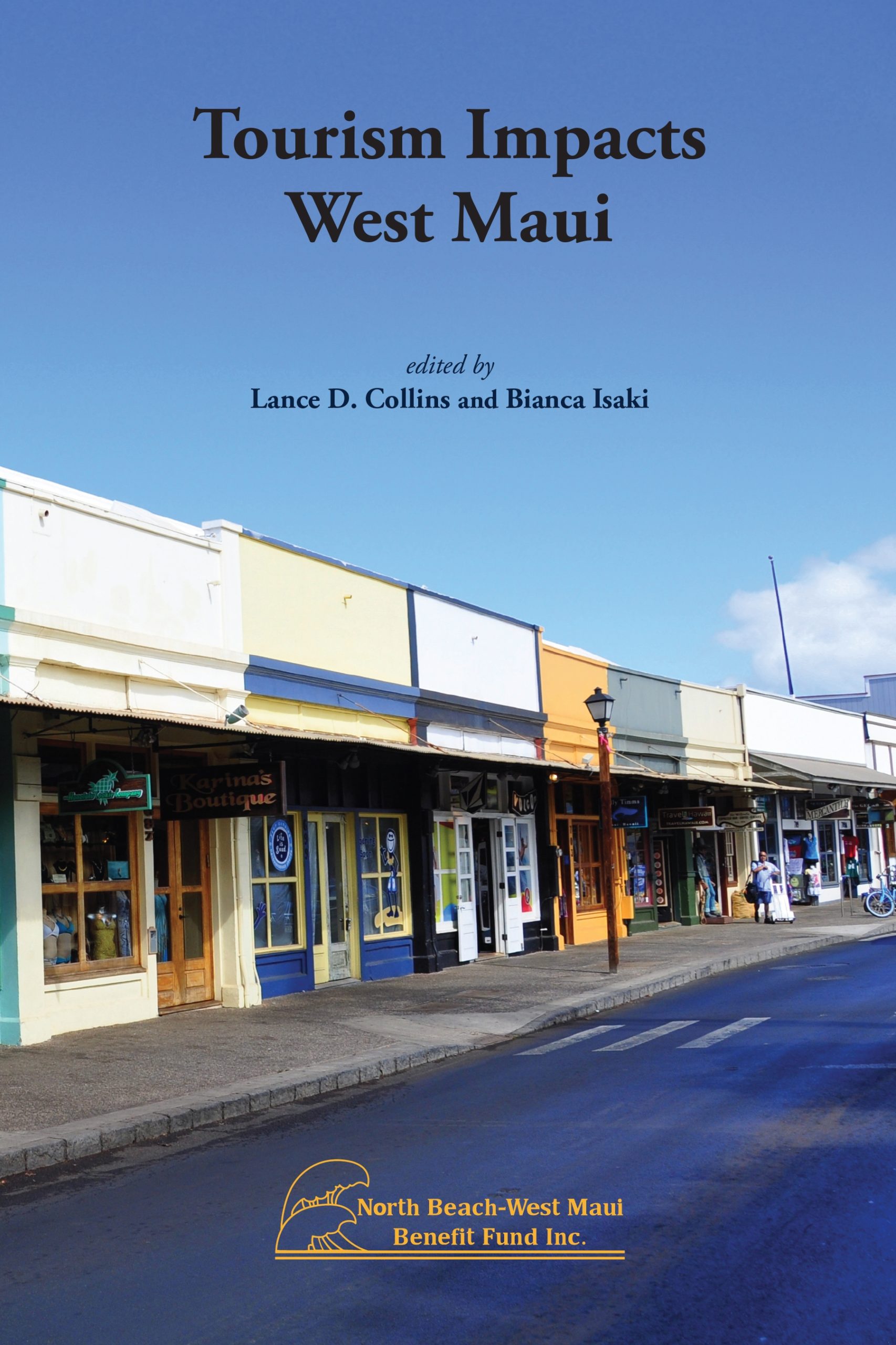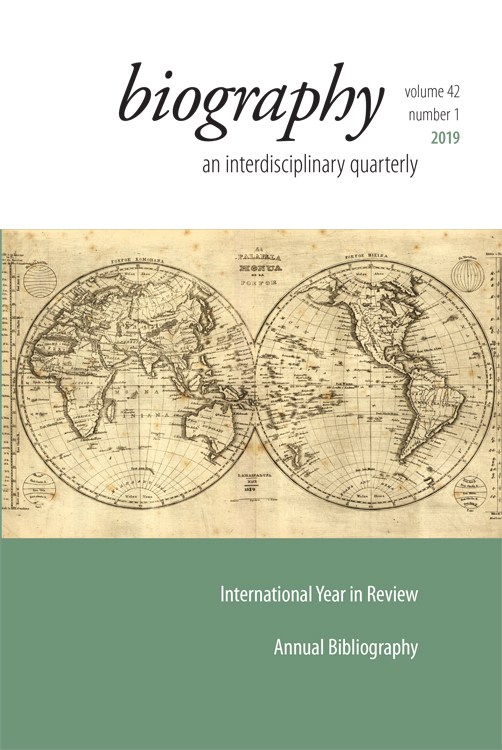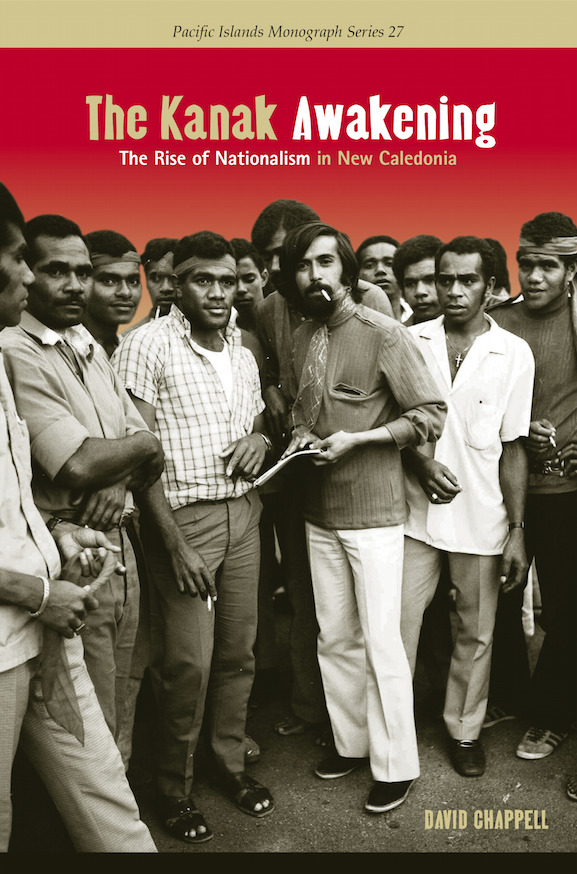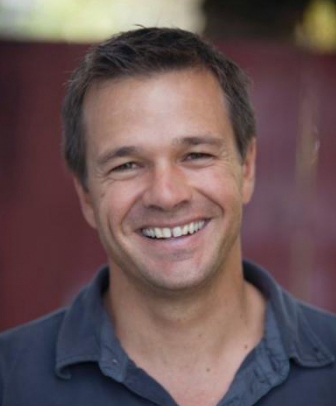Category: ethnography
Biography Vol. 42 No. 1 (2019)
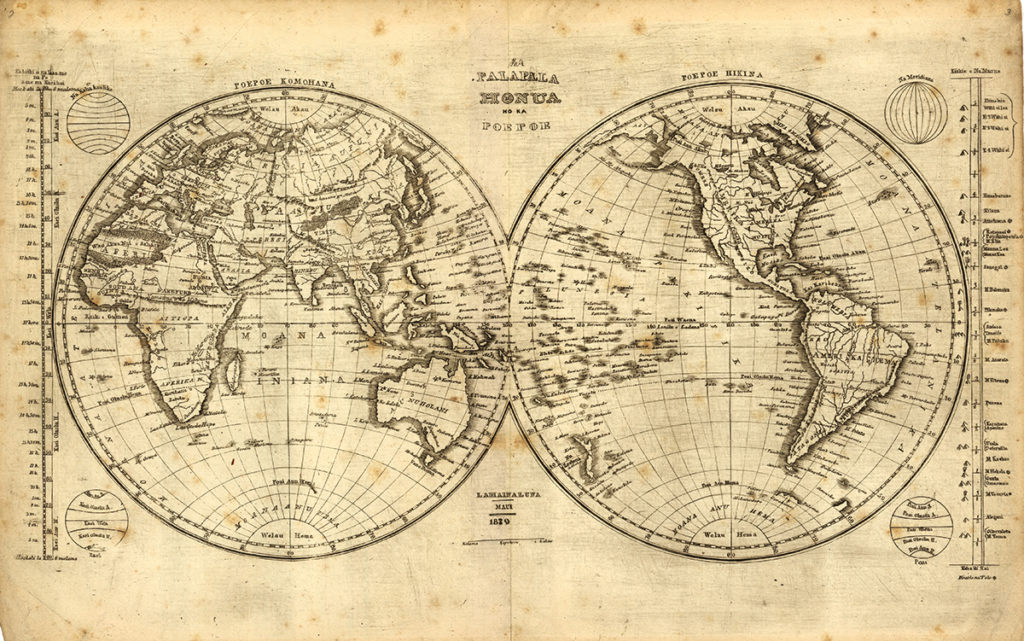
INTERNATIONAL YEAR IN REVIEW
The International Year in Review is a collection of short, site-specific essays on the year’s most influential publications in life writing. This year’s collection includes entries from Australia, Austria, Brazil, Canada, China, Colombia, Estonia, France, the Gulf Cooperation Council, India, Italy, Korea, Lebanon, Mexico, the Netherlands, Palestine, Poland, Portugal, Puerto Rico, Romania, South Africa, Spain, the UK, and two essays from the US, one on biography and one on memoir.
Contents
Essays as Life Writing: The Year in Australia
Kylie Cardell
The Tercentenary of Maria Theresa (1717–1780): The Year in Austria and Germany
Tobias Heinrich
The Brazilian “I/Eye” at the IABA Global Conference: The Year in Brazil
Sergio da Silva Barcellos
Musicians’ Lives and National Identity: The Year in Canada
Alana Bell
Independent Biographical Documentaries: The Year in China
Chen Shen
Testigo de barbarie y resistencia: El año en Colombia
Gabriel Jaime Murillo-Arango
Life Writing’s Coming of Age: The Year in Estonia
Leena Kurvet-Käosaar and Maarja Hollo
The Ghosts of World War II: The Year in France
Joanny Moulin
Selves and Identities in the Arabian Gulf: The Year in the Gulf Cooperation Council
Szidonia Haragos
What the Stars Tell: The Year in India
Pramod K. Nayar
Biographies from the Alps to Capri: The Year in Italy
Ilaria Serra
Emergent Subjectivities: The Year in Korea
Heui-Yung Park
Archiving the Political, Narrating the Personal: The Year in Lebanon
Sleiman El Hajj
Politics and Violence: The Year in Mexico
Gerardo Necoechea Gracia
Mediators as the Subject of Dutch Biography: The Year in the Netherlands
Hans Renders and David Veltman
Voices against Erasure, Loss, and Dehumanization: The Year in Palestine
Adam Yaghi
A Time of Great Biographies—Gombrowicz and Herbert: The Year in Poland
Paweł Rodak
“No Coward Soul is Mine”: The Year in Portugal
Cláudia Faria
Auto/Biography After Disaster: The Year in Puerto Rico
Ricia Anne Chansky
Cultural Figures and the Biographical Turn: The Year in Romania
Ioana Luca
“Born-Frees” on South Africa’s Memory Traps: The Year in South Africa
Nick Mdika Tembo
Auto/Biography and Conflict: The Year in Spain
Ana Belén Martínez García
“The necessary disloyalty”: The Year in the UK
Tom Overton
#MeToo and the Memoir Boom: The Year in the US
Leigh Gilmore
American Biography: The Year in the US
Carl Rollyson
Annual Bibliography of Works about Life Writing, 2017–2018
About the Journal
For over forty years, Biography: An Interdisciplinary Quarterly has explored the theoretical, generic, historical, and cultural dimensions of life writing.
Subscriptions
Single issue sales and annual subscriptions for both individuals and institutions available here.
Submissions
Unsolicited manuscripts between 2,500 to 7,500 words are welcome. Email inquiries and editorial correspondence to biograph@hawaii.edu.
Beyond Ainu Studies: Changing Academic and Public Perspectives
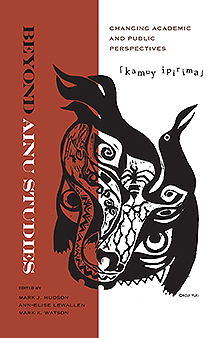 In 2008, 140 years after it had annexed Ainu lands, the Japanese government shocked observers by finally recognizing Ainu as an Indigenous people. In this moment of unparalleled political change, it was Uzawa Kanako, a young Ainu activist, who signalled the necessity of moving beyond the historical legacy of “Ainu studies.” Mired in a colonial mindset of abject academic practices, Ainu Studies was an umbrella term for an approach that claimed scientific authority vis-à-vis Ainu, who became its research objects. As a result of this legacy, a latent sense of suspicion still hangs over the purposes and intentions of non-Ainu researchers.
In 2008, 140 years after it had annexed Ainu lands, the Japanese government shocked observers by finally recognizing Ainu as an Indigenous people. In this moment of unparalleled political change, it was Uzawa Kanako, a young Ainu activist, who signalled the necessity of moving beyond the historical legacy of “Ainu studies.” Mired in a colonial mindset of abject academic practices, Ainu Studies was an umbrella term for an approach that claimed scientific authority vis-à-vis Ainu, who became its research objects. As a result of this legacy, a latent sense of suspicion still hangs over the purposes and intentions of non-Ainu researchers.
This major new volume seeks to re-address the role of academic scholarship in Ainu social, cultural, and political affairs. Placing Ainu firmly into current debates over Indigeneity, Beyond Ainu Studies provides a broad yet critical overview of the history and current status of Ainu research.
The Kanak Awakening: The Rise of Nationalism in New Caledonia
In The Kanak Awakening, David Chappell examines the rise in New Caledonia of rival identity formations that became increasingly polarized in the 1970s. It explores in particular the emergence of activist discourses in favor of Kanak cultural nationalism and land reform, multiracial progressive sovereignty, or a combination of both aspirations. Most studies of modern New Caledonia focus on the violent 1980s uprising, which left deep scars on local memories and identities. Yet the genesis of that rebellion began with a handful of university students who painted graffiti on public buildings in 1969, and such activists discussed many of the same issues that face the country’s leadership today.
“This is a very valuable contribution to the literature on New Caledonia’s recent history and the search for Kanak identity in a world of decolonization. The author shows an excellent command of the literature, not only the discussions leading up to the ‘Melanesia 2000’ event but the long archaeological and anthropological record. It is a valuable synthesis of the ways in which the political and the cultural have connected to produce and interesting experiment of decolonization without independence.” —John Kim Munholland, Professor Emeritus, Department of History, University of Minnesota
November 2013 | 352 pages | 7 illustrations
ISBN: 978-0-8248-3818-8 | $60.00 | Cloth
Pacific Islands Monograph Series No. 27
Colonialism, Maasina Rule, and the Origins of Malaitan Kastom
 Colonialism, Maasina Rule, and the Origins of Malaitan Kastom is a political history of the island of Malaita in the British Solomon Islands Protectorate from 1927, when the last violent resistance to colonial rule was crushed, to 1953 and the inauguration of the island’s first representative political body, the Malaita Council. At the book’s heart is a political movement known as Maasina Rule, which dominated political affairs in the southeastern Solomons for many years after World War II. The movement’s ideology, kastom, was grounded in the determination that only Malaitans themselves could properly chart their future through application of Malaitan sensibilities and methods, free from British interference.
Colonialism, Maasina Rule, and the Origins of Malaitan Kastom is a political history of the island of Malaita in the British Solomon Islands Protectorate from 1927, when the last violent resistance to colonial rule was crushed, to 1953 and the inauguration of the island’s first representative political body, the Malaita Council. At the book’s heart is a political movement known as Maasina Rule, which dominated political affairs in the southeastern Solomons for many years after World War II. The movement’s ideology, kastom, was grounded in the determination that only Malaitans themselves could properly chart their future through application of Malaitan sensibilities and methods, free from British interference.
Kastom promoted a radical transformation of Malaitan lives by sweeping social engineering projects and alternative governing and legal structures. When the government tried to suppress Maasina Rule through force, its followers brought colonial administration on the island to a halt for several years through a labor strike and massive civil resistance actions that overflowed government prison camps. David Akin draws on extensive archival and field research to present a practice-based analysis of colonial officers’ interactions with Malaitans in the years leading up to and during Maasina Rule.
2013, 552 pages, 21 illustrations, 3 maps
$59.00; ISBN: 978-0-8248-3814-0, Cloth
Pacific Islands Monograph Series (No. 26)
Sounding Out Heritage: Cultural Politics and the Social Practice of Quan Họ Folk Song in Northern Vietnam
Sounding Out Heritage explores the cultural politics that have shaped the recent history and practice of a unique style of folk song that originated in Bắc Ninh province, northern Vietnam. The book delves into the rich and complicated history of quan họ, showing the changes it has undergone over the last sixty years as it moved from village practice onto the professional stage. Interweaving an examination of folk music, cultural nationalism, and cultural heritage with an in-depth ethnographic account of the changing social practice of quan họ folk song, author Lauren Meeker presents a vivid and historically contextualized picture of the quan họ “soundscape.”
Village practitioners, ordinary people who love to sing quan họ, must now negotiate increased attention from those outside the village and their own designation as “living treasures.” Professional singers, with their different performance styles and representational practices, have been incorporated into the quan họ soundscape in an effort to highlight and popularize the culture of Bắc Ninh province in the national context. Sounding Out Heritage offers an in-depth account of the impact of cultural politics on the lives and practices of quan họ folk singers in Vietnam and shows compellingly how a tradition can mean many things to many people.
2013, 200 pages, 18 illustrations
$45.00 ISBN: 978-0-8248-3568-2, Cloth
Southeast Asia: Politics, Meaning, and Memory
November 2012 Author Events
Thursday, November 8, 12 noon to 1:15 p.m.
Wendy S. Arbeit shares her experiences in researching Hawaiian cultural and utilitarian objects, her techniques used in revealing their patterns, and how she documented them with detailed line drawings in her award-winning book, Links to the Past: The Work of Early Hawaiian Artisans.
Some of the questions that will be addressed:
What went into tracking down those artifacts now scattered across the globe?
What do the 1,400 illustrations tell you about pre- and early contact Hawaiian culture and the ways it changed in response to Westerners?
What sort of questions are raised by the grouping of so many objects?
The talk is part of the Brown Bag Biography series at the Center for Biographical Research, University of Hawai‘i at Mānoa, Henke Hall 325, 1800 East-West Road. For more information, see the UH event calendar or call 808-956-3774 or email: biograph@hawaii.edu.
Thursday, November 8, 5:00 to 7:00 p.m.
BYU-Hawaii professor and former competitive surfer Isaiah Walker will give a lecture at Arizona State University on his thought-provoking book, Waves of Resistance: Surfing and History in Twentieth-Century Hawai‘i. Walker explains how Hawaiian surfers have successfully resisted colonial encroachment in the po‘ina nalu (surf zone). In making his case, he also explores empowerment and masculinity, media representation of islanders, identity struggles, and other topics. The talk is open to the public and will be held in West Hall, Room 135, at ASU in Tempe. For more information, see the ASU calendar posting.
Tuesday, November 13, 6:00 to 9:00 p.m.
See below listing under November 18 for George and Willa Tanabe’s Japanese Buddhist Temples in Hawai‘i.
Saturday, November 17, 3:00 p.m.
San Diego resident Leilani Holmes will visit Basically Books in Hilo, Hawai‘i to discuss and sign copies of her recent work, Ancestry of Experience: A Journey Into Hawaiian Ways of Knowing. Born in Honolulu in 1952 to a Hawaiian mother, Holmes was adopted as an infant by a haole (Caucasian) couple who moved to Ohio when she was four years old. The book recounts, explores, and analyzes the author’s quest to reclaim her origins and come to terms with the duality inherent in being an indigenous adoptee. The two-column format of the book mirrors this dichotomy, with a personal, conversational style of narrative on one side, and academic explanatory text on the other.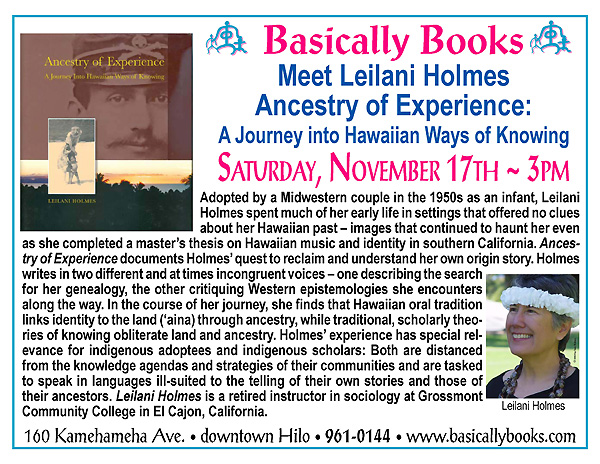
Saturday, November 17, 4:00 p.m.
Seattle author/poet/artist Alan Chong Lau will be at the Wing Luke Museum’s Tateuchi Story Theatre to join his sister, food writer Linda Lau Anusasananan, as she reads from The Hakka Cookbook, published by University of California Press. (Read a related post on the UC Press blog here.) Alan Lau provided the artwork for the book, done in a similarly whimsical, sumi-e style that illustrates his UH Press-published book of poetry, Blues and Greens: A Produce Worker’s Journal.
 Sunday, November 18, 2:00 p.m.
Sunday, November 18, 2:00 p.m.
George J. Tanabe and Willa Jane Tanabe will appear at Barnes & Noble, Ala Moana Center, for a signing of their just-released guidebook, Japanese Buddhist Temples in Hawai‘i: An Illustrated Guide. The Tanabes personally visited each of the ninety temples still in existence, and took photographs not only the buildings’ exteriors but of the ornate altars and interior details. Over 360 of these color photos are contained in the book. Descriptions of each temple and explanations of the symbolism of objects and design elements will help temple visitors decipher the meaning behind these physical expressions. Also at this event, information will be distributed on the related exhibit due to open December 1 at the Japanese Cultural Center of Hawai‘i.
Last-minute update: On Tuesday, November 13, 6:00 to 9:00 p.m., George and Willa Tanabe will give a PowerPoint lecture at the Honpa Hongwanji Hawaii Betsuin Annex Temple (makai of the main temple), 1727 Pali Highway. Open to the public, with a $10 fee. For more information, click here for a link to the Dharma Light Project brochure and map, or call 808-536-7044.
American Aloha Now Available in Paperback
“Until now our only look at folk festivals has been through the eyes of visitors or through the insider eyes of folklorists and others who practice ‘public folklore and folklife’ as they have worked on such festivals. Diamond’s fine book places the reader between those two poles of naïve appreciation and heavily-invested, insider commentary.” —The Yearbook for Traditional Music
“A critical, multi-vocal case study that explores tradition, representation, cultural commodification, identity, tourism, sovereignty, and nationalism through the processes and outcomes of culture brokering for public consumption. . . . American Aloha will interest a broad readership interested in Hawaiian culture and history, museums, representation, tourism, and the construction of nationalism. Diamond’s skill at weaving theoretical themes with detailed data and anecdotes makes the book read like a collection of personal memories and characters with whom the reader can identify.” —The Contemporary Pacific
July 2011 / ISBN 978-0-8248-3616-0 / $21.00 (PAPER)





